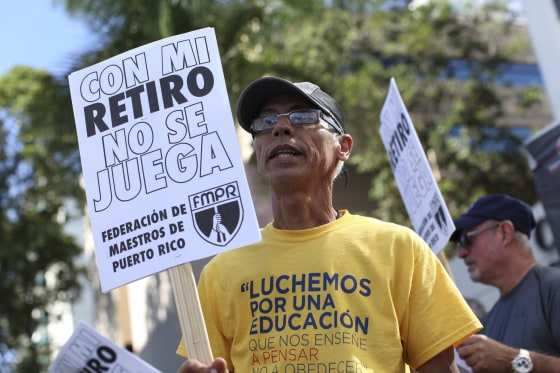Acknowledging that it was running out of time to stem a worsening economic crisis in Puerto Rico is running out, the House approved a bill described as “bitter medicine” for the U.S. territory.
The bill, known by its acronym PROMESA, which translates to promise, passed with rare bipartisan support 297-127 Thursday.
“It forces Puerto Ricans to take some bitter medicine,” said Rep. Steny Hoyer, D-Md., the House minority whip.
It took three attempts and an impending July 1 deadline for Republicans to negotiate a bill with Democrats and the administration that had any chance of passing.
The legislation would allow the seven-member control board to oversee negotiations with creditors and the courts over reducing some debt. It does not provide any taxpayer funds to reduce that debt.
It would also require the territory to create a fiscal plan. Among other requirements, the plan would have to provide "adequate" funds for public pensions, which the government has underfunded by more than $40 billion.
Its passage was helped along by the endorsements of two of the senior Puerto Rican members in Congress, Rep. Nydia Velázquez, D-N.Y. and Rep. Jose Serrano, D-N.Y., who are both Puerto Rican.
“The stark reality we now face is that, other than PROMESA, there are simply no other politically feasible options left on the table,” Velázquez said.
Serrano cited the urgency to help Puerto Rico for accepting the bill despite its shortcomings.
“Watching the island sink as Congress has ignored our pleas for help has been disheartening and difficult,” Serrano said. “We are now faced with urgent needs, as Puerto Rico is running out of time and cash.”
Related: #YoNoMeQuito Movement Aims to Inspire, Uplift Puerto Ricans
Puerto Rico faces a July 1 deadline for a $2 billion debt payment. For about two and a half years, the island has seen tens of thousands of people leave and many relocate to the mainland U.S. Pew Research Center reported last year that the departures were the highest seen in the last half century.
As the island has been unable to pay a $72 billion debt it has shuttered schools and laid off hospital employees. Its pension accounts are severely underfunded. Providing basics to people such as electricity and public safety are becoming difficult and jobs are becoming more scarce.
A few hours before debate on the bill began, the White House issued a statement saying it had concerns about language in the bill allowing Puerto Rico employers to pay workers under 25 below minimum wage and preventing implementation of new rules allowing more workers to get overtime.
The White House said the bill could do more to protect pensions and that it needed a more “robust voice” for Puerto Ricans on a oversight board that will make a number of financial decisions for the U.S. territory.
But the White House urged Congress to pass the bill quickly “before this crisis grows materially worse.”
It is uncertain how quickly the Senate will act but there have been indications from Sen. John Cornyn, R-Texas, that it would take up the House bill after it passed.
Many conservatives were willing to support the bill rather than having to authorize a tax-funded bailout for the island later. The bill requires Puerto Rico to pay the cost of the fiscal oversight board.
"The debt crisis is the result of years of liberal policies where the government carelessly borrowed and overspent," said Rep. Raul Labrador, R-Idaho, who helped draft the bill and muster support for it from other conservatives.
"As a person who was born and raised in Puerto Rico and somebody who is very proud of his Puerto Rican heritage, I love the people, I love the island and I hope this bill sets them on the path to fiscal responsibility and a brighter future," Labrador said.
Related: Young Puerto Rican Works to Increase Islands Agricultural Entrepreneurs
The bill has not been popular in Puerto Rico. Last weekend, a Puerto Rico gubernatorial candidate, Ricardo Rosselló Nevarez, was chosen by voters in a primary over the island’s representative in Congress, Pedro Pierluisi, who supported the bill’s passage.
Pierluisi, who backs statehood for Puerto Rico, said the bill is a first step and called for more equal treatment of Puerto Rico and its citizens.
One of the Democrats voting against the bill was Rep. Luis Gutiérrez, D-Ill., who also is Puerto Rican.
“President Obama spoke of the special place of the birth of his father. Puerto Rico is the place of the birth of my father, “ Gutierrez said earlier from the House floor. “I cannot come here and turn my back on the place of my father.”
This story includes material from The Associated Press.

